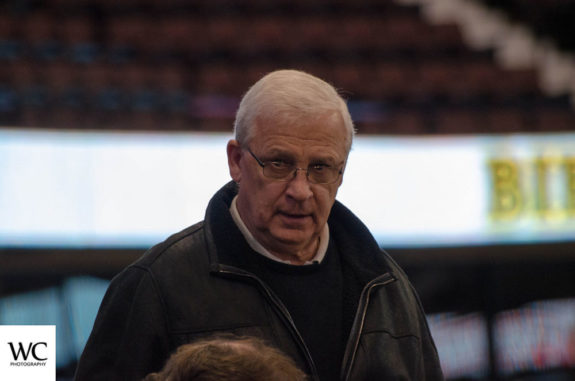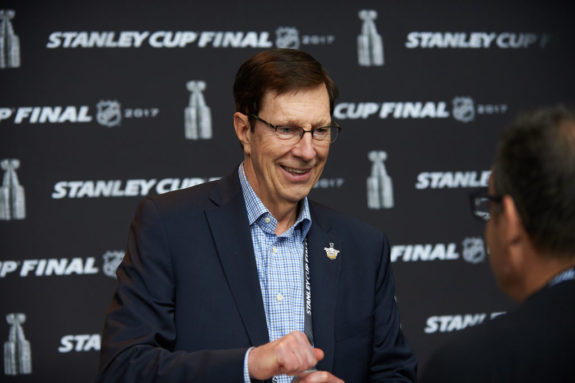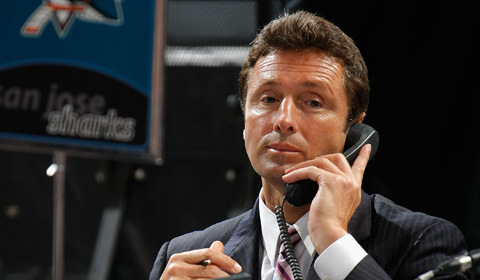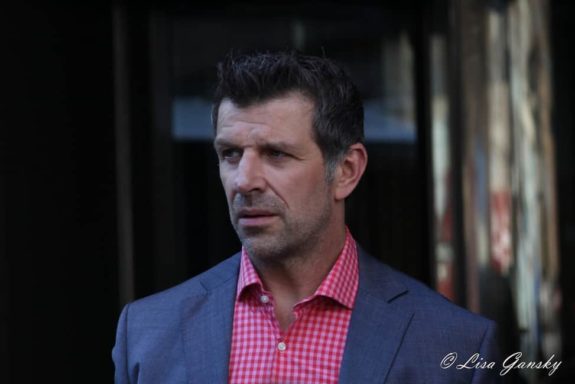What follows is a team-by-team analysis of the last 10 years of the NHL draft – 2008 until 2017, inclusive – with regards to the success of said teams’ draft picks at the NHL level.
Methodology for Judging NHL Draft Success
This article revolves around the definitely-scientific-and-not-at-all arbitrary Drafting Score measure, which I definitely didn’t think of just now. It’s not a perfect metric, but it’s a quick and dirty way to assess a team’s prospecting prowess.
Having only been through one draft, the Vegas Golden Knights are exempt from this ranking. For everyone else, I took four categories – all traditional statistics, and weighted them according to their (roughly) relative importance.
The four measures were GP (games played; the cumulative number of NHL games a team’s draft picks have played), 100+ GP (the number of draftees for a given team that have played 100 or more NHL games), G (goals; the cumulative number of NHL goals a team’s draft picks have scored) and PTS (points; the cumulative number of NHL points a team’s draft picks have amassed).
Each team was ranked inversely from 1-30, with the best-drafting team in each category receiving 30 points.

For the sake of goaltenders, most defensemen and non-offensive forwards, the two games-played measures received a weighting of 1.0, while points were weighted at 0.5 and goals at 0.25.
Why even include goaltenders at all, given they’re not really factors in two of the categories? Well, over the span of a decade, one would expect a roughly equivalent number of goaltenders to be drafted by each team, so their dearths in goals and points should even out, while the illuminating games-played numbers would speak for themselves. Simply put, I felt the inclusion of goaltenders would enrich the exercise.
Anyway, at the end of it all, all the rankings were added up to create a drafting score, a metric which showed incredible variation across the league.
Ranking NHL Teams’ Draft Success
Bow Down Before NHL Draft Dominance

Likewise, perhaps no two teams underscore the importance of things other than drafting than the Senators and Islanders. Both teams have exceptional records when it comes to who they’ve drafted over the past decade, and yet both have been perennially mediocre at best – hit or miss to get into the playoffs, and bottom-feeding bad at worst. It’s a shame both of these franchises are consistently gong shows, as they’ve really wasted some fine work by their draft teams.Perhaps no two teams underscore the importance of good drafting like the Ducks and Lightning. In recent years, both teams have been beset by an unfathomable amount of injuries to critical players. And yet, every single season, both keep clawing their way into contention, filling every hole created by injury with impact players seemingly manufactured out of thin air, like something out of Call of Duty‘s Zombies mode. Good drafting and development can make up for much of the unpredictability of the NHL.
Not Your First Rodeo, Eh?

You’ve got teams that are perennially competitive thanks to their draft excellence, able sustain their on-ice performance by eschewing players when they become too expensive, knowing they’ve got the ability to replace them from within (Predators, Blackhawks, Capitals).Despite sustained draft success in this bunch, the on-ice products have proven a real mixed bag.

You’ve got teams that, at some point over the course of the past decade, have had to rebuild, and have methodically amassed a well-stocked stable of talent that is a piece or two away from challenging for the Stanley Cup (Jets, Hurricanes).
And then you’ve got teams who’ve hit on plenty of talent at the draft, but have proved utterly incapable of surrounding them with complementary players and competent staff, resulting in a decade of (mostly) futility (Oilers, Panthers, Sabres).
Crushing Draft Mediocrity Fuels NHL Playoff Bubble

Yes, the Blues were great for a long time – and have the potential to bounce right back after a transition year in 2017-18, but did anyone really take them seriously as Cup contenders? And yes, the Rangers had a couple deep runs, including an appearance in the Cup Final in 2014, but their success had more to do with Henrik Lundqvist dragging their sorry asses to respectability every season than anything else.Much of this section is comprised of the teams you’d expect to be here. Teams that, for the last decade, have been hovering around the playoff bubble, generally never bad enough to raise eyebrows (except for the Coyotes) but generally never good enough to be a Stanley Cup contender, either.
Don’t Sell the Bike Shop, Orville

Now firmly in the draftually inept section of the rankings, we see an assortment of teams that, for whatever reason, just haven’t been able to figure things out.

The Bruins have figured out quality, but haven’t been able to muster much quantity. The Penguins have had a reasonable number of guys make the show for 100 or more games, but not many with substantial results to speak of.
The Sharks, Maple Leafs and Flyers have just plain seen their prospect pipelines run dry for much the past decade (though the Maple Leafs in particular have been much better of late).
It would be more than reasonable for these fan bases to be up in arms. Fortunately for the teams involved, there are some who are even worse.
You Do Know There’s a Draft, Right?

Yes, the Canucks were a top contender for a number of years this past decade but so were the Kings and Blackhawks, and they’ve both done reasonably well, draft-wise. Besides, Vancouver’s had a first-round pick in each of the past 10 years, save for 2010 when they didn’t pick until the Fourth Round.Seriously, what have the Canucks and Habs been doing every June?
As for the Canadiens, they’ve graduated a league-low six prospects to 100 or more NHL games since 2008, and only two from the First Round – Nathan Beaulieu (2011; no longer with the organisation) and Alex Galchenyuk (2012; no longer with the organisation).
Hilariously, the next closest to 100 games from the Habs’ draft history is Mikhail Sergachev (2016; no longer with the organisation).

Given what we know about the philosophy of both teams, my only guess is that both organisations entirely pooh-pooh the draft combine in favour of judging players purely on their ability to make a specified amount of jam while operating a gritting machine.
(More) History Will Be Made
Certainly, many teams have not had the same regime running the show for the past 10 years. Plus, on-ice success can lead to lower draft positioning, theoretically – particularly in early rounds – making it less likely to find NHL-calibre players. And yes, regardless of personnel and positioning, drafting is a decidedly inexact science, to say nothing of the development of said draft picks.
However, it’s still interesting to look at organisational draft histories, and to speculate on what exactly might be fuelling a team’s success, failure or abject mediocrity. Is it a matter of scouting? An organisational philosophy? A decade’s worth of good fortune (or lack thereof)?
In any event, no team can change the past.
Starting Jun. 22 though, they’ll have their once-per-year chance to improve the future. (originally written in June 2018)